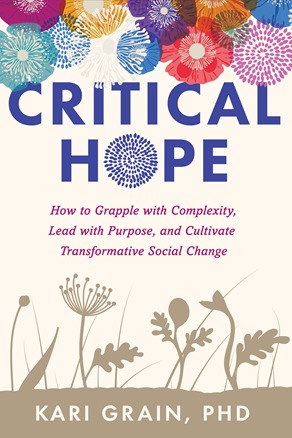Description
Introducing the 7 principles for practicing critical hope--because hope isn’t something you have; it’s something you do.
Each person has a unique, ever-changing relationship to hope.
Hope alone can be transformational--but in moments of despair, or when you’re up against profound injustice, it isn’t enough on its own. Hope without action is, at best, naive. At its worst, it tricks you into giving up the power and agency you have to change systems that cause suffering.
Enter critical hope: a spark of passion, an abiding belief that transformation is not just possible, but vital. This is hope in action: a vibrant, engaged practice and a commitment to honoring transformative potential across a vast spectrum of experience.
Dr. Kari Grain, PhD, offers 7 principles for practicing critical hope:
Hope is necessary, but hope alone is not enoughCritical hope is not something you have; it’s something you practice.Critical hope is messy, uncomfortable, and full of contradictions. Critical hope is intimately entangled with the body and the landCritical hope requires bearing witness to social and historical traumaCritical hope requires interruptions and invitationsAnger and grief have a seat at the table The principles for practicing critical hope are not what you might think: they confront toxic positivity and take up discomfort, social injustices, and an ethos of hospitality toward anger and grief. But held in this same space is a love for connection–and an honoring of what makes you feel alive.
Inspired by her global research, teaching experiences, and education curriculum taught at the University of British Columbia, Dr. Grain shows that to cultivate critical hope--and combat despair--you need to show up with your whole self, in all its messy, passionate, vibrant complexity.
About the Author
KARI GRAIN, PhD, is a university educator whose work centers on global engagement, transformative learning, and social justice. Throughout her writing and teaching (as well as her everyday life), she weaves a love for relational, embodied, and experiential ways of knowing the world. Her professional path has included waitressing for nearly ten years; running diversity and human rights education programs; and leading in-school learning opportunities for immigrant and refugee youth. Grain earned her PhD in Educational Studies at the University of British Columbia, where she is a faculty member in the Adult Learning and Global Change master's program. She teaches courses on community engaged research, leadership, and social change, and is currently collaborating as a co-editor of a volume on these topics. Grain also consults with organizations to enhance their community engagement practices and equity and inclusion strategies. Her work has been featured in various academic journals, podcasts, and websites.
